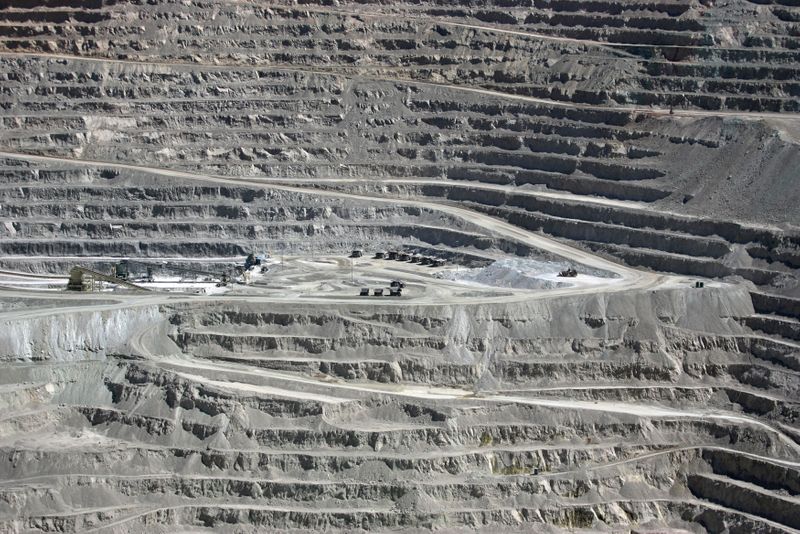By Marco Aquino and Fabian Cambero
LIMA/SANTIAGO (Reuters) - In South America's copper-rich Andes political risk is rising as high poverty and debt levels amid the COVID-19 pandemic drive potentially sharp policy shifts and put mining wealth into the crosshairs of angry citizens and political leaders.
In No. 1 copper producer Chile, an overhaul of its market-orientated constitution is underway, and it is debating whether to hike royalties on miners. Peru, the No. 2 producer, is heading for a polarized June presidential election with a little-known socialist leading in the polls who wants to redistribute mining wealth.
"Some 42% of world copper mining production is under political uncertainty that could entail risks on future production," said Juan Carlos Guajardo, head of the Chilean consulting firm Plusmining.
That uncertainty is helping support global copper prices that have hit record highs as post-pandemic Chinese demand bounces back, as well as rapid development of a green revolution of electrification seen as driving further appetite for the metal in years ahead.
But in Latin America itself a bounceback looks some way off. The COVID-19 pandemic has driven a spike in poverty, propelling measures to unlock and redistribute wealth as many struggle to stay afloat amid lockdowns and high healthcare costs.
That has put mineral resources in focus, given the outsized role they play in the region's economic engine.
Peruvian presidential front-runner Pedro Castillo has pledged to keep 70% of mining profits in the country and stop foreign firms' "plundering", and has warned he could nationalize some resources. He leads in opinion polls ahead of the June 6 vote, though right-wing Keiko Fujimori is gaining ground.
Chile is in the midst of a longer process to rewrite its Augusto Pinochet-era constitution, which underpinned decades of growth but has also been blamed for stoking inequality that led to violent protests that rocked the country in 2019.
Chile's lower house also approved this month a bill that would sharply hike taxes on copper mining to pay for social programs, which some industry insiders warned could bring mining to a halt.
Pablo de la Flor, executive director of Peru's main mining chamber, said there were issues of resource allocation that needed to be addressed. But the solution lay in reforming inefficient local governments rather than the tax regime, he said.
"Sadly the funds haven't been used properly to close social gaps, leaving productive regions lagging behind," he said. (Graphic: Copper prices hit records, https://fingfx.thomsonreuters.com/gfx/ce/jbyvryrampe/Copper%20prices%20hit%20records.PNG)
COMMON SENSE TO PREVAIL?
The convergence of risks is creating the most uncertain backdrop in years, although the region has long been volatile, with frequent political changes, protests and strikes.
Mining executives said that some of the risk may be tempered as those seeking the boldest changes came up against political opposition and were forced to water down their plans.
Diego Hernandez, head of Chile's mining industry group Sonami, said the opposition-led mining royalties bill would likely get amended in the upper house before being given the green light.
"I do not think the project will be approved as it is today in the Senate because it would be very irresponsible and reckless," he told Reuters. He warned earlier in May the bill would be a vote in favor of "no more mining".
"In a period where we all have to worry about the economic recovery, dispensing with or strangling mining does neither of these countries any good. In the end, one hopes that common sense will prevail."
Chilean state miner Codelco is the world's largest producer of copper, while the Andean country is home to BHP's huge Escondida mine and Collahuasi, a joint venture by Glencore (OTC:GLNCY) and Anglo American (LON:AAL).
In Peru, Diego Macera, director of the Peruvian Institute of Economics, said redistribution of mineral wealth was an obvious way to raise public funds for the post-pandemic recovery, though a fragmented congress would likely limit the power of whoever becomes president.
But, he added, the uncertainty could put off investors, fearful the state will seize assets.
"Nobody likes to put in $1-1.5 billion of investment when the head of state might nationalize it," he said.
Peru has a slate of some $56 billion in mining investments. Longrunning community opposition has already paralyzed some projects, including Southern Copper (NYSE:SCCO)'s Tia Maria project and a $5 billion gold project by Newmont and local firm Buenaventura.
In Chile, Plusmining's Guajardo said miners' focus on existing "brownfield" projects meant production levels would dip if new investments weren't made to upgrade them.

"If you don't make those investments you will have to manage an asset that is going to have a tendency to decline in its grades and variables," he said.
"That will be reflected in lower production." (Graphic: Yearly copper prices, https://fingfx.thomsonreuters.com/gfx/ce/oakpekaonpr/Yearly%20copper%20prices.PNG)